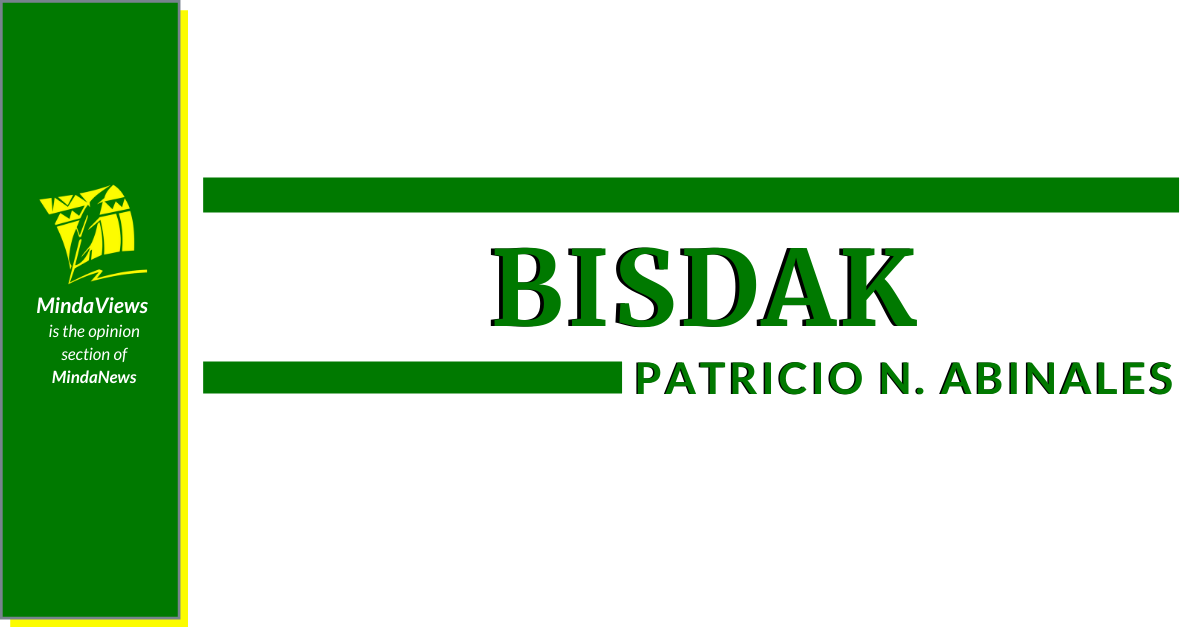
HONOLULU (MindaNews / 09 January) — After the last piece, Duterte Studies Industry: Di Orig si Mayor, let us now examine Digong’s populism which the Duterte Studies Industry (DSI) has consistently missed because its more productive authors bothered very little in immersing themselves in local politics. As a result, the question they have consistently failed to answer is where this popularity of one, if not the most openly brutal President we’ve had, comes from.
Here, let me try to venture a couple of explanations. The first has to do with the nationalization of television and how this impacted Davao politics. In the mid-1980s, the four major television networks began opening stations in the provinces outside the two big cities, Manila, and Cebu. In the beginning, these stations were only airing Manila shows, but by the 1990s, they began to produce their own “provincial news” segments and variety shows in the local languages.
Then in 1998, Congressman Duterte, representing the 1st district of Davao City, did something that any politician in Mindanao had never done. He put up his own Sunday talk show on the Davao channel of ABS-CBN, the country’s largest television network, where he would respond to the “concerns” of his constituents. My friend, the Davao journalist and editor of Mindanews Carolyn Arguillas wrote that the show would “ensure his continued presence among the Dabawenos whom he had served as mayor from 1988 to 1998.” Arguillas pointed out that “the three-term limit had caught up with Duterte, hence the decision to run for Congress, an elective post he found boring, but which gave him time to bond with daughter Sara, then a law student in Manila.”
READ: Once upon a time, Duterte was a ‘Kapamilya’ star
Duterte called his show “Gikan sa Masa, Para sa Masa,” a translation of Mao Tse Tung’s famous phrase “From the Masses to the Masses” (already hinting at some influence of leftwing politics on him), and every morning Dabawenos would watch in delight as Duterte spewed bile, issued threats, and smeared his political rivals, all mixed with funny asides, and fatherly advice to his audience. The audience ratings for Gikan sa Masa, Para sa Masa easily topped the television edition of the Catholic Church’s Sunday mass and the preaching of non-Catholic ministries. Everyone eagerly awaited the show, and you would hear a collective lament if he were not available. Politicians in other provinces began to copy Duterte and produce their versions. These politicians were not as colorful as Duterte, but it was clear to these local strongmen that television had become a more effective way of reaching out to constituents. Then, with the advent of YouTube in 2005 and Facebook’s video platform in 2007, their reach expanded beyond their localities and provinces and even reached audiences abroad.
Second, there is also the mirror between the official language of the nation-state and the coarse argot of local power which Duterte would break. The latter was used to attract provincial, city, and town-mates in public meetings, campaign stops, and backroom deals, while the former was for national and international affairs. Even the foul-mouthed of provincial, city or town bosses would turn diplomatic once they found themselves in the halls of Congress, the executive office, or when talking to embassy representatives and officers of international aid agencies. My favorite example here was the local boss of my hometown in Ozamiz. The Asian Development Bank had released a glossy report of the state of its aid projects in Mindanao. On an inside page, the Bank cites then-mayor Reynaldo Parojinog as “confident that the mall will generate more income for the city. With full occupancy and with the efficient collection and use of fees, the public mall can be a good source of revenue for the city, he smiled.” Parojinog, who in private spoke rough Visayan, also happened to be the leader of Kuratong Baleleng, which began as an anti-communist militia then morphed into one of the most successful drug syndicates in Mindanao. In July 2017, the mayor, his wife, and ten others were killed in a pre-dawn police raid ordered by Duterte, who had promised to wipe out the entire family. So how would ADB write an update about Ozamiz in the light of Parojinog’s execution?
This divide between the official language of the nation-state and the language of local power continued unnoticed or ignored by the media. By the late 1990s, however, there were signs that the wall between the two political discourses was beginning to weaken. The first indication of this inter-mixing came up during the short reign of President Estrada when his campaign team came up with a brilliant tactical plan to get voters to his side. They published a collection of his alleged sayings, in which he supposedly “massacred” the English language. ERAPtion: How to Speak English without Really Trial became a national best-seller, and Estrada, action-star, tough city mayor, confessed womanizer, and Senator (the only law he managed to pass was for the Preservation of the Water Buffalo or Carabao), then vice-president, won by a considerable margin of 10.7 million votes over the intelligent, savvy, polished chair of the House of Representatives, Congressman Jose de Venecia, who only received 4.2 million votes. Duterte would take this linguistic appeal a notch higher by bringing the nasty side of the vernacular of local politics with him to the presidential palace. (to be continued).
[MindaViews is the opinion section of MindaNews. Patricio N. Abinales, an Ozamiznon, teaches at the University of Hawaii-Manoa. He studies the four-legged rat (a pestilence that brought famine in many parts of postwar Mindanao) and the two-legged rat (the politico)]







